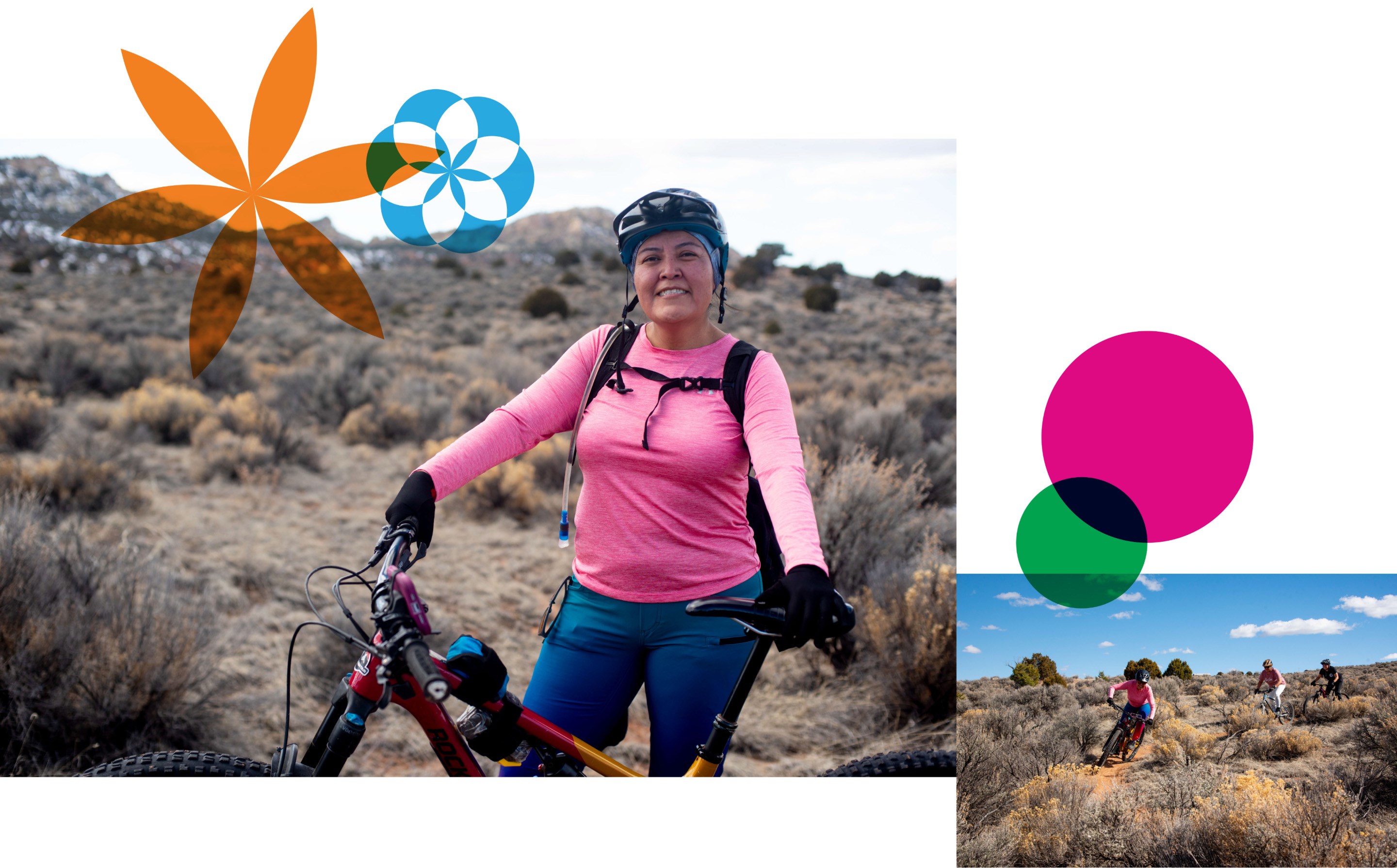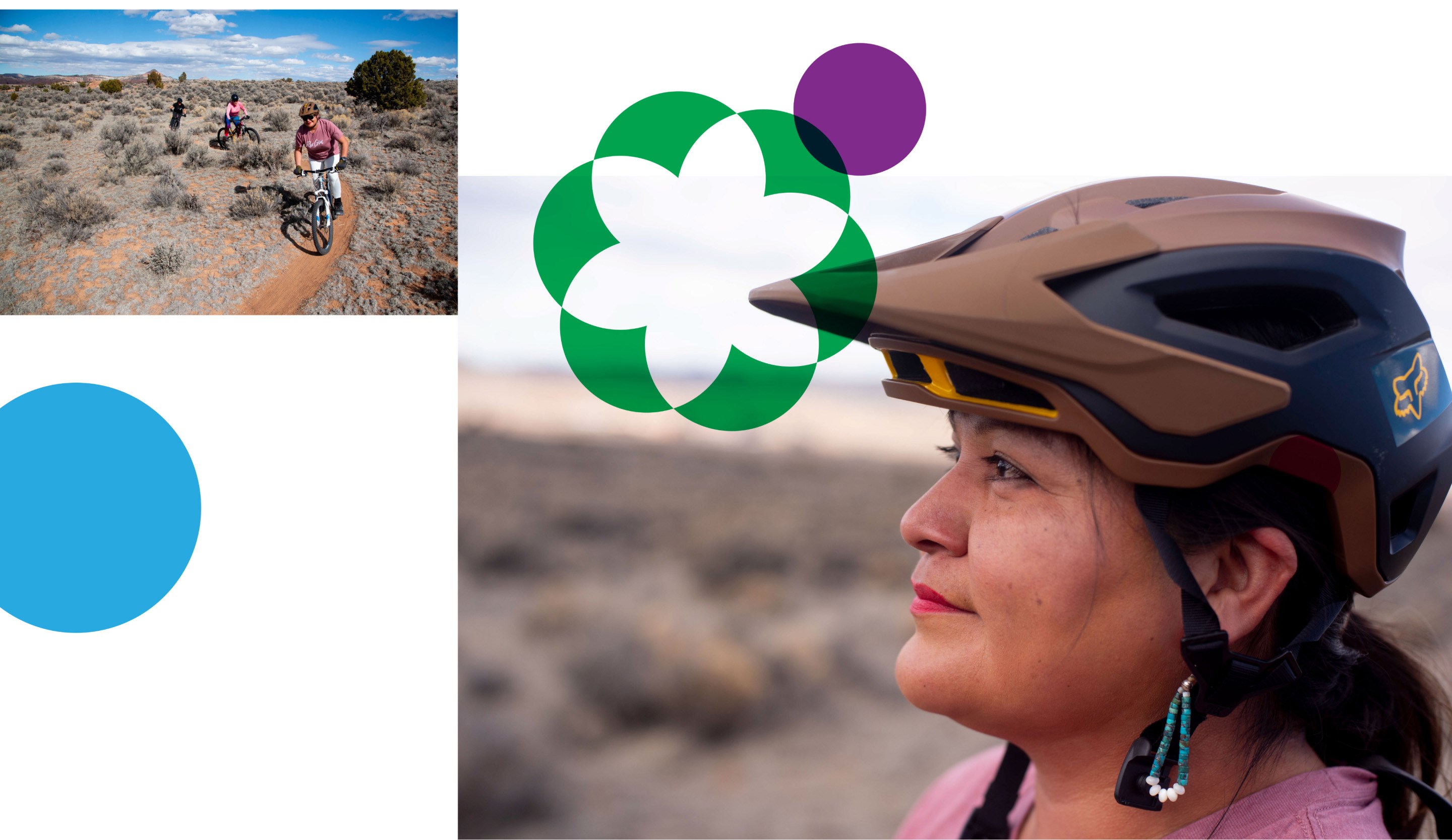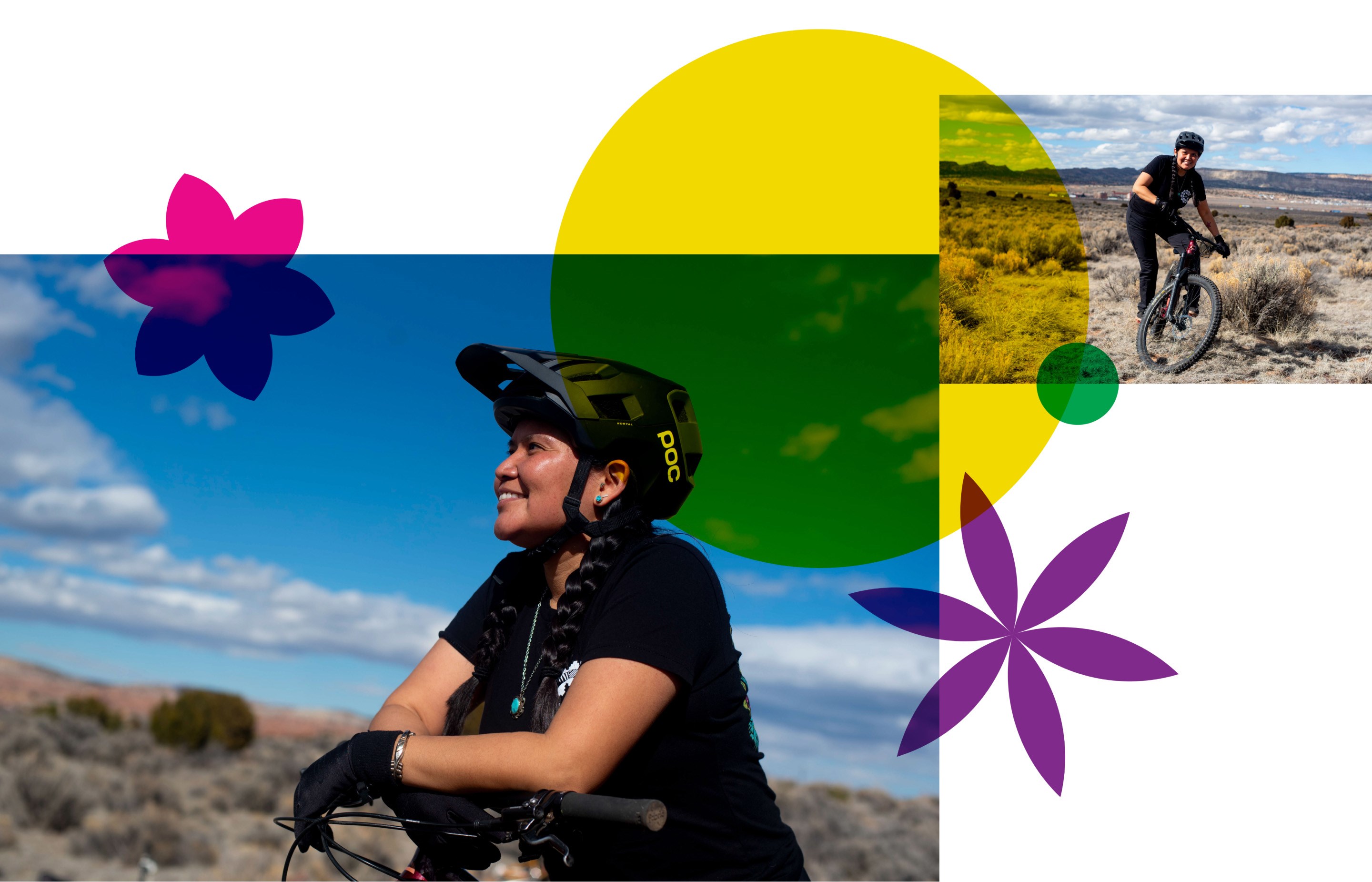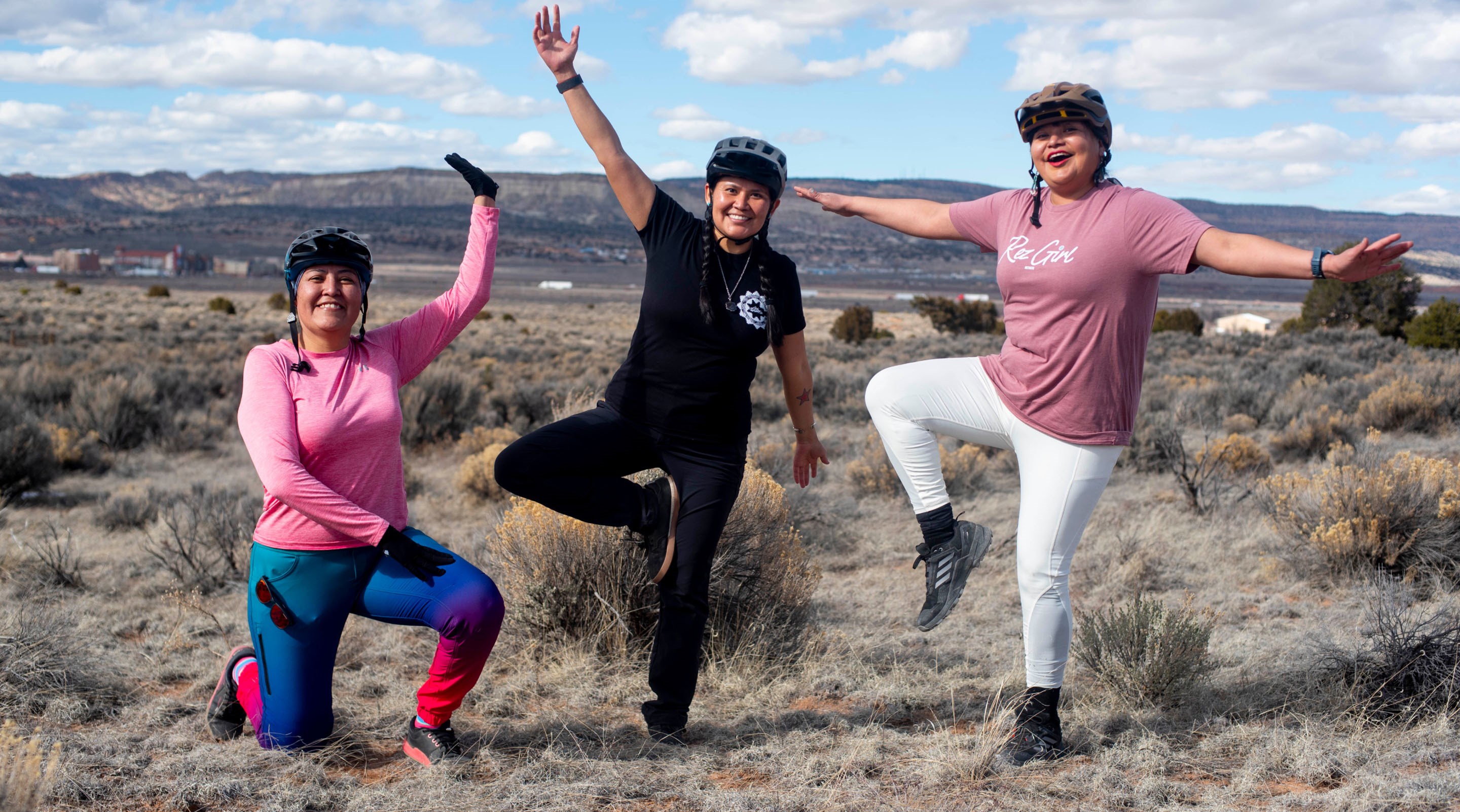DINÉ WOMEN RIDE GUIDES
BY WENDY BOOHER
Navajo, or the preferred name, Diné (“the people”), is a matriarchal society where these humble, yet quietly powerful women have prioritized the health and well being of their community while maintaining its cultural identity at the same time. These modern guardians of tradition are not immune to the consequences of history. Yet motivated to improve their community and to preserve their cultural values for future generations, they’ve adopted mountain biking to show the people of Navajo Nation how to regard themselves and their land as valuable heritage. Here are some of their stories.
Delilah “Shyle” Goodluck

My clans are Totsohnii (Big Water Clan) nishłį́, Naasht’ézhí Dine’é (Zuni Clan) báshíshchíín, ’Áshįįhí (Salt People) dashíchei, and Bit’ahnii (Folded Arms People) dashináłí.
Shlye, pronounced “Sh-lie,” began mountain biking three years ago with a goal to get her son, Michael, into a healthy activity. Practically anywhere else in the U.S., an obvious choice for an 11-year-old boy would have been baseball, football, or soccer.
“I make it sound like all those things are available in the Nation, but they’re not,” Shlye explained. “If I were to get him to like one of those sports, I’d have to drive up to two hours just so that he could be on a team.”
When she mentioned mountain biking to him, it caught his attention, but Shlye had no idea what the Navajo Nation had to offer them. And when she searched for resources, she found nothing — no marked trails, no trail systems, no groups especially for youth — in fact no groups at all. That changed when she found Silver Stallion Bicycle and Coffee Works, a nonprofit with a goal to combine industry-leading programs and community networks to foster the next generation of riders, young professionals, and community leaders. The people behind Silver Stallion — almost all of them Diné — have become a trusted resource for cycling on Navajo land. They offered her advice on where to ride and invited Michael to join them for a ride. Shlye quickly realized that she would have to ride with him and, while she knew nothing about mountain biking at first, that changed when she got her first full suspension mountain bike.
“You always hear that you have to earn your full suspension by riding a hardtail,” she said, “but I just wanted to ride and ride as much as I could — enduro, downhill, and I couldn’t do that with a hardtail.”
When she expressed her ambitions, she felt heard and then she felt encouraged to challenge herself on steeper, more technical trails. When she’s not dropping in to bike parks or cool mountain bike destinations, like Sedona, Ariz., she keeps up with her skills on her regular lunch loop near her office where she sessions the chunky bits and berms on a daily basis. Her rides are mostly solo, yet she rides with one of the other women featured here, Jamie, at least once a week. As vast, serene, and breathtaking as Navajo Nation is, it’s not enough to organize a ride to bring people together; it needs to be an event oriented around the community.
“When you bring the community together, everybody has their strengths,” Shlye explained. “You don’t have to be a rider, you can be an elder and just set up your chair, hang out with the other elders and have a conversation while people are off riding. You can have people grilling food so that when the riders come back, everyone can eat — that’s a huge thing on the Navajo Nation — being able to share a meal together because a lot of our ceremonies, traditions, and cultural concepts revolve around food and coming together. There are a lot of ways people can be involved in a community ride.”
When you bring the community together, everybody has their strengths
Treating people with equal importance also empowers the collective whole, which is made up of individuals who’ve been conditioned to put the needs of others first. The strength of the Diné lies in the women, who have been raised to fortify their community.
“Culturally, Navajo people are built around a matriarchal society, so the women will take the lead, but they will also put themselves last and always make sure that everyone else has been taken care of first,” continued Shlye.
She pointed out that this was how she got into mountain biking, that it was her son who was at the center of her endeavor. Understanding this as only a Diné woman can, Shlye organizes rides for her community and makes sure that everyone who joins her rides feels welcome. Inclusion is a given among the Diné. Everyone has a place and a purpose whether you show up to ride, to catch up with the elders, to prepare and serve food, or to care for children while their parents or guardians are off riding. Shlye creates environments where the invitation includes all walks of life, even you. If you show up, you are one of us.
Vanessa Frank

My clans are Kin ł ichii'nii (The Red House People Clan) nishłį́ and Naakai dine'é (The Mexican Clan) bashishchiin.
When you’ve got everything to gain, and little to lose, saying “Yes” to new opportunities becomes second nature. Vanessa started riding a bike to a volunteer job at the Tohatchi Senior Center in Navajo Nation confident that if she just kept showing up and working hard, someone would think of her when a job opening came up. She quickly landed that job and used her instincts to connect with the generations of Diné all around her to learn their stories as she was writing her own. You would’ve never known that when she arrived at the senior center, she was struggling to find suitable housing, jobless, financially unstable, and responsible for her infant son. Fearless in the face of adverse circumstances, Vanessa exercised her ability to change her life, which led to an associate degree in science and then a bachelor’s degree in business administration, both from the University of New Mexico. She also said “Yes” to a flier for a community bike ride organized by Little Bellas, the nationwide mountain bike program for girls, and simply showed up without knowing where it would take her. She rode with her sisters and cousins when she was younger and, since she couldn’t go back to that time of carefree riding, she found that same spark in the other riders — mostly women — who showed up for the community bike ride. These rides with her community reignited the passion she once had for riding a bike.
“I am trying to find myself and enjoy reviving my mountain biking hobby,” Vanessa said. “It’s amazing to be about women empowerment and to gather with other women who have the same interests. Every time we get together the environment’s got good energy."
It’s amazing to be about women empowerment and to gather with other women who have the same interests. Every time we get together the environment’s got good energy.
Self-reliance and aspiration are too powerful to keep to oneself, so Vanessa selflessly gives back, both as a mountain bike ride leader and teacher at Thoreau (“Threw”) High School, where she teaches freshman algebra and senior financial literacy. She mountain bikes for fun and to get healthy, yet her most compelling reason to ride is the opportunity to spend more time with her son, Silas. Together they ride every weekend with Silas’s dog, Blue, and it’s in these moments that Vanessa shares her influence as a mother, leader, and guardian of their culture.
“Where I ride is in my community. My favorite sounds are the trees and the wind — I want my child to experience those things, to slow down time and be out in nature. That’s what I crave in a sense…to be still.”
Jamie Yazzie

My clans are Tachnii'nii (The Red Running into the Water) and Naakai dine'é (The Mexican Clan).
Sometimes riding a bike takes you to a place that’s more than just a destination. For Jamie, cycling helped her connect with her physical being, which helped her connect with the earth and bring her educational and career aspirations into balance. If she could apply pressure to her pedals and rekindle a relationship with her ancestral land, she could teach others to do the same. This led to a bachelor’s degree in organizational leadership, which she taps into every time she motivates people to get outside and reconnect with the earth — essentially to go outside and play in the dirt. Respecting the land and treating people with equality were instilled in her from the start, and it’s these qualities that Jamie brings with her on every ride.
“I've been molded from the beginning to take care of my family and my community and to lead people toward harmony,” Jamie said. “This has taught me passion, empathy, and a greater appreciation of people and their diverse perspectives. I may not always agree but at least I am mindful of other perspectives.”
I've been molded from the beginning to take care of my family and my community and to lead people toward harmony
Mountain biking has been woven into the rich tapestry of Jamie’s family. Her son, Pythagoras, learned to ride this year and her daughter, Nevaeh, loves to ride with the whole family. Her spouse, Lorenzo, is an experienced mechanic and manages cycling-related programs for Silver Stallion. When she started riding three years ago with Lorenzo, she immediately embraced mountain biking and has since learned the trails of her cherished land. With support from Little Bellas, she now leads mountain bike rides for her people to help them be less afraid and realize their own brimming potential.

These women show us without pretense what it means to lead without leading, to guide using an internal compass that’s been passed down to them from their mothers, from their mothers’ mothers, and so on. Mountain biking ignites something in them that they can’t — in fact they won’t — keep to themselves because they see the benefit to their community.
